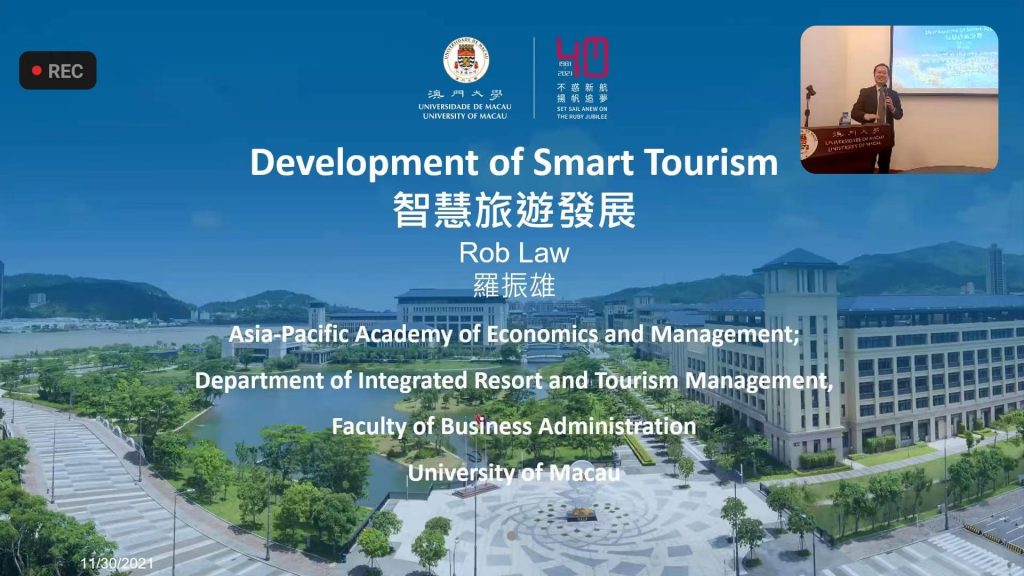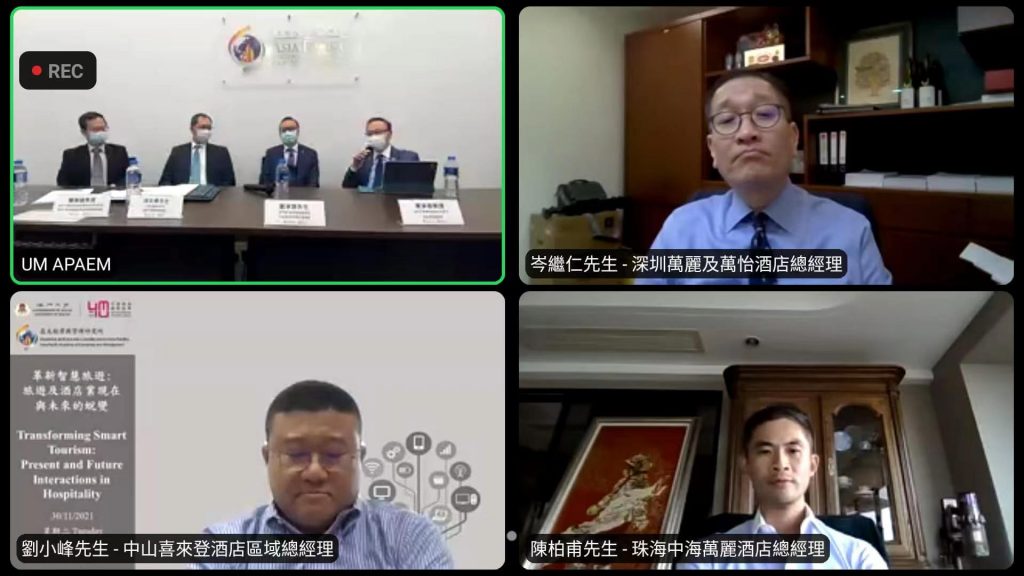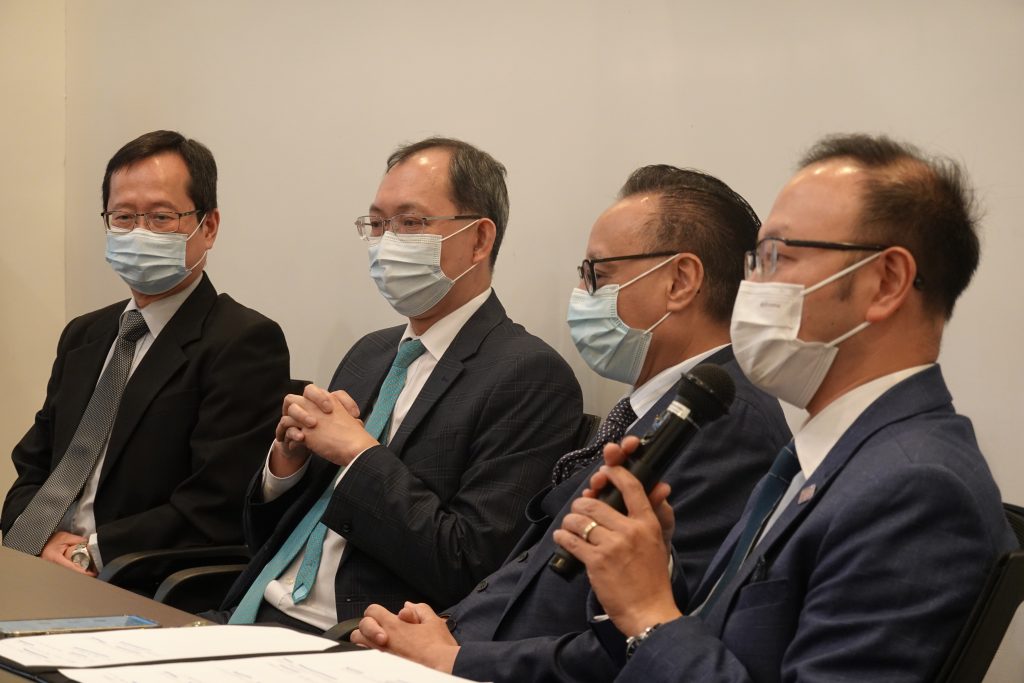
Prof. Rob Law’s Presentation on Smart Tourism

The Panel Discussion

On-site Panelists
On the afternoon of November 30th, the Asia-Pacific Academy of Economics and Management of the University of Macau hosted an online roundtable seminar on the theme of “Transforming smart tourism: Present and future interactions in hospitality”, attracted hundreds of online participants.
Mr. Victor Lau, Assistant Senior Vice President of Hospitality & Leisure Sales of Galaxy Macau, Mr. Ronald Ho, Complex Director of Finance of Ritz Carlton & JW Marriott Hotel, Mr. Chris Shum, Complex General Manager of Renaissance and Courtyard Shenzhen, Mr. Patrick Chen, General Manager of Renaissance Zhuhai Hotel, Mr. Arthur Lau, Area General Manager of Sheraton Zhongshan served as panelists to discuss the practical opportunities and challenges of smart tourism in the hospitality industry with two APAEM scholars, Prof. Rob Law, UMDF Chair Professor of Smart Tourism at the University of Macau, and Prof. Alfred Wong, Interim College Master of Cheng Yu Tung College of the University of Macau.
Prof. Michael Hui, the Vice Rector of Academic Affairs of the University of Macau, gave an opening remark for the seminar. He said that the central government supports Macao in promoting appropriate economic diversification, and Macao will focus on promoting the development of new industries such as cultural tourism, exhibition, commerce, and so on in the future. In addition, he also expressed his best wishes for the success of this seminar. This seminar focused on three themes: the challenges faced by the hotel hospitality industry when using smart technology, the opportunities that smart technology brings to the hotel hospitality industry, and reflections and suggestions on the use of smart technology to promote the development of the hotel industry.
Prof. Rob Law believes that the rapid development of smart tourism has obvious benefits to cultural tourism, exhibition and commerce. He introduced the important role of smart tourism in economic development with examples such as “shopping and services becoming more digital during the COVID-19 pandemic” and “smart tourism continued to increase in the share of global retail.” In addition, Prof. Rob Law conducted data analysis and supported evidence based on the impact of the big data era on hotels and tourism products, the benefits of using big data analysis in the tourism industry, and the degree of government support for smart tourism.
In terms of the development strategy of the Greater Bay Area, Prof. Rob Law divided it into two themes: promotion and cooperation. In terms of promotion, focus on “developing smart tourism apps” and “promoting Macao’s cultural characteristics”. In terms of cooperation, it was emphasized that the government needs to re-examine the existing tourism mechanism and related laws and regulations, establish a smart tourism system suitable for the realities and long-term development of Macau society. By investigating the limitations of smart tourism in Hong Kong and Macau, it is concluded that Hong Kong and Macau need to learn from mainland cities (such as Shenzhen) to develop smart tourism products and services.
Focusing on the opportunities and challenges that big data brings to the hospitality industry, Mr. Victor Lau and Mr. Ronald Ho interpreted opportunities for innovative tourism and the current status of the development of the tourism industry from their application fields. They took popular cities at different stages of development as examples, analyzed the status of smart tourism, and explained the importance of collecting, using, and sharing big data to capture customer needs for the hospitality industry. Mr. Ronald Ho said that in the era of big data, it is very important to realize the trinity of people, SOP, and technology in hotel operations. Mr. Chris Shun, Mr. Patrick Chen, and Mr. Arthur Lau believe that the hospitality industry should consider customer information security when using big data, and rationally use big data under the guidance of relevant policies and regulations. Mr. Arthur Lau mentioned that the hospitality industry in the Greater Bay Area should accelerate the integration of updated technology and learn from each other’s experiences.
The guests also talked about the hot topic on the application of robots in the hospitality industry. The guests from Guangdong and Macao agreed that the application of robots in the hotel industry could improve hotel operation efficiency, improve customer experience, reduce labor costs, and adapt to the needs of epidemic prevention and control, but it also brings some problems. Mr. Patrick Chen pointed out that the robot application did not specifically consider the service standards and supporting needs of five-star hotels, reducing direct contact with customers and being unable to provide customers with personalized services. Therefore, hotels and tourism practitioners can consider service innovation, and at the same time, enhance the introduction of robotic service models (such as delivery by drone).
Regarding the future development and application of smart technology in the hospitality industry, the guests present their prospects. Mr. Chris Shum believes that increasing relevant policy support and material input by the government is the foundation, and improving user-friendliness is the core in implementing intelligent services. Mr. Patrick Chen proposed that policy support, input-output rate optimization, and employee training should be multi-pronged. Mr. Victor Law and Mr. Ronald Ho said that the further improvement of data sharing and smart service platforms is inseparable from the guidance and promotion of the government.
At the end of the conference, the guests patiently and meticulously answered the relevant questions that were concerned and interested by the online audience participating in the seminar. An online participant asked questions about the hotel’s motivation to invest in robots and what the hotel should do to make live broadcasts (such as Douyin) increase sales. Mr. Victor Lau said that all industries would have a process of the live delivery of goods. If a hotel wants to make it continue to be successful, it must find the right method, make targeted packaging, and make changes concerning the characteristics of the times. Another online partcipant asked the guests about the cooperation promoted in Macau at this stage (such as local vlogger). Mr. Patrick Chen gave answers in light of the current situation, the status quo of Macau, and coordinated development. At the end, the seminar finished with great success and participants took home with deeper understanding about the technology applications in the hospitality sector in Greater Bay Area.

